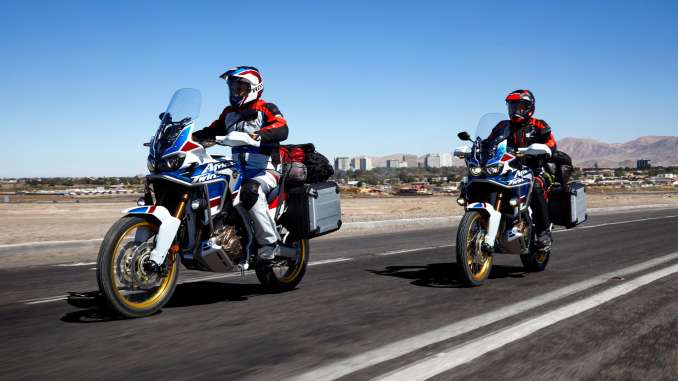
NEW DAY, NEW ADVENTURES.
2018 Honda Africa Twin Adventure Sports CRF1000L2 Review on Total Motorcycle:
Get ready for an even better Africa Twin, the new Adventure Sports 30th Anniversary Edition. Same great engine, but now you get a bigger fuel tank, more suspension travel, throttle-by-wire, a larger skid plate, wider footpegs and a flatter seat. There’s even a rear rack.
When the CRF1000L Africa Twin was introduced in 2016 as an homage to the successful XRV650 and XRV750, the full-scale adventure motorcycle was immediately heralded for being equally capable of crossing rugged continents and highway cruising. Now, the “True Adventure” spirit of the award-winning model expands with the introduction of the CRF1000L2 Africa Twin Adventure Sports, which pushes the platform even further into the long-range off-road-ready territory. In addition, the standard CRF1000L Africa Twin has received important updates.
Similar in overarching design, both 2018 models offer a superb balance of power and light weight, a key component to the platform’s success and user-friendly nature. They also benefit from added electronic functionality and improved engine performance. To build on this and enhance its adventure-touring capabilities, the Adventure Sports model offers improved range through a larger fuel tank, more creature comforts for longer touring, and added ground clearance through increased suspension travel.
It’s been 30 years since the legendary Honda XRV650 Africa Twin first rolled into Europe and while the motorcycle that now bears its name – launched in 2016 as the CRF1000L Africa Twin – shares no common part with the forerunner it inherits the essence and spirit of what made the original so good.
The balance between power and weight is the Africa Twin’s secret, then and now. The renewed machine has proved itself a modern-day all-rounder, popular with casual tourers and off-road adventurers alike (plus all riders in between) because it offers enjoyable and usable engine performance in a chassis that works as well on-road as it does off.
For 2018 Honda is building on the Africa Twin’s strengths, and its success. The base model CRF1000L Africa Twin receives a host of detail upgrades to both manual transmission and Dual Clutch Transmission (DCT) options that enhance the riding and owning experience, while the new CRF1000L Africa Twin Adventure Sports version extends the platform even further into long-range off-road ready territory.
A new version of Honda’s definitive full-size adventure machine is ready for Adventure Sports in 2018, with larger fuel tank for a range of over 500km, higher riding position, greater ground clearance, heated grips, extended fairing plus longer travel suspension. It also has Throttle By Wire with 3 riding modes, expanded Honda Selectable Torque Control parameters and revised intake and exhaust. The original Africa Twin’s 30th anniversary is celebrated with unique paint scheme.
Mr K. Morita, Large Project Leader (LPL) 2018 Honda Africa Twin Adventure Sports
“Our CRF1000L Africa Twin has proven itself a worthy successor to the original and very much the ‘Go Anywhere’ machine that we set out to make. Over the last two years it’s a motorcycle that’s covered millions of kilometres, and we have received plentiful feedback from owners. For 2018, with the Africa Twin Adventure Sports we have used the revised CRF1000L as a starting point and added everything the long-distance rider needs to get the very most out of any adventure.”
Model Overview
Side-by-side with its sibling, the CRF1000L Africa Twin Adventure Sports is obviously taller, with a flatter seat profile and more upright riding position. The fairing and screen offer more wind protection and a large sump guard and side pipe fully protect the machine. An extra 5.4L fuel capacity extends range beyond 500km, while heated grips and an AC charging socket add comfort and convenience.
The Africa Twin Adventure Sports’ comprehensive abilities start with its engine, which has to perform in off-road situations as well as on-road, over long-range tours, short commutes and all points in between. As such, it provides an optimum balance between power, torque, mass and physical dimension.
The four-valve 998cc parallel twin Unicam unit’s tractable and usable all-day performance belies its extremely compact dimensions. They are the result of clever packaging touches such as housing the water pump within the clutch casing, and using the engine’s balancer shafts to also drive water and oil pumps. As a result, longitudinally, it is the same length as Honda’s popular 500cc engine, and its short height contributes to the Africa Twin Adventure Sport’s 270mm of ground clearance.
For 2018, a modified airbox improves the power unit’s mid-range response, as does a lighter balancer shaft weight. A revised exhaust serves up an even more evocative howl as revs rise and also contributes to the improved performance.
A significant addition to the Africa Twin platform for 2018 is its new Throttle By Wire (TBW) system, which brings with it 3 riding modes to adjust engine character and output to suit riding conditions. Also new is an extended range of Honda Selectable Torque Control (HSTC) input.
The unique DCT (Dual Clutch Transmission) version features the standard manual mode – allowing the rider to operate gearshifts through triggers on the left handlebar – and two automatic modes. D mode offers the best balance of fuel economy and comfort cruising whilst S mode gives three different, sportier shift patterns to choose from. The DCT is also fully equipped to operate in an off-road environment and off-road functionality is enhanced by the G button. Pushing the G button in any riding mode modifies the control of the clutch system to give a more direct drive.
The semi-double cradle steel frame provides the ideal balance of high-speed stability matched to genuine off-road ability by combining sheer strength with flexibility. The engine is mounted on 6 engine hangers, which keeps vibration to a minimum, avoiding the need for steering dampers. The new lithium-ion battery saves 2.3kg on the 2017 Africa Twin’s lead unit, and the Adventure Sports version shares several detail changes made to improve the platform’s off-road ability and durability.
Fully adjustable 45mm Showa inverted forks, fully-adjustable rear shock, dual radial-mount Nissin four-piston brake calipers and 310mm ‘wave’ style floating discs are unchanged for 2018. The 21-inch front and 18-inch rear spoked wheels are constructed from stainless steel. In addition to the standard dual-purpose 90 front/150 rear rubber, block tyres are also approved for fitment.
Dual LED headlights maintain the original Africa Twin’s presence and the seat height adjusts 20mm from the 900mm to 920mm (both respectively 50mm higher than the standard model). The 24.2L fuel tank – and the engine’s fuel efficiency of 21.8km/l (WMTC in DCT mode) – provides a range of over 500km.
The 2018 CRF1000L Africa Twin Adventure Sports will be available in one 30th anniversary Tricolore paint scheme to celebrate the XRV650’s launch in 1988.
2018 Honda Africa Twin Adventure Sports CRF1000L2 Totalmotorcycle.com Key Features
Honda’s Africa Twin platform grows today with the announcement of the 2018 CRF1000L2 Africa Twin Adventure Sports, which was introduced alongside an updated standard 2018 CRF1000L Africa Twin at the EICMA motorcycle show in Milan. Following a European release early next year, both models will be available in the U.S. in summer of 2018. Suggested retail price for the Adventure Sports model is approximately $2,000 higher than that of the current Africa Twin.
Displayed previously in concept form, and developed as a powerful extension of the “True Adventure” mantra that drives the Africa Twin platform, the new Adventure Sports version features increased suspension travel, added ground clearance, enhanced creature comforts, and a larger fuel tank for extended range. Both the Adventure Sports and the standard Africa Twin feature a long list of updates to the engine, electronics, and rider interface, while continuing to offer an ideal balance of power and light weight.
“The Africa Twin’s success on showroom floors and in comparison tests is evidence of the platform’s profound capabilities, but the Adventure Sports model expands the possibilities by making it possible to ride further and more comfortably,” said Lee Edmunds, American Honda’s Manager of Motorcycle Marketing Communications. “We’ve enjoyed seeing our customers put their own interpretations on the Africa Twin’s ‘True Adventure’ ethos, and with the increased capabilities of the new Adventure Sports, as well as those of the updated standard Africa Twin, we expect that spirit will be applied in new and exciting ways.”
- Colors
- CRF1000L2 Africa Twin Adventure Sports: White/Blue/Red
- CRF1000L Africa Twin: TBA
- Availability: Summer 2018
KEY FEATURES
- Africa Twin Adventure Sports has a larger fairing matched with an 80mm taller screen to offer greater wind protection, and comes standard with heated grips and a 12 volt accessory socket, facilitating longer tours in wide-ranging conditions
- Adventure Sports model comes standard with larger sump guard and front light bars, as well as brushed-aluminum cowling panels, rear mudguard, and easily removable steel rack
- Adventure Sports model has larger, 6.37-gallon fuel tank (compared to 4.97 gallons on the standard model), extending range
- Both CRF1000L Africa Twin models now have auto-canceling turn indicators
- Adventure Sports model’s seat features a flatter profile and a 1.2-inch-taller height than standard model. The seat adjusts .8 inches, for a seat height of either 35.4 inches or 36.2 inches (compared to 33.5 inches and 34.3 inches). Handlebar position is 1.3 inches higher and .2 inches rearward compared to the standard version
- Adventure Sports model has a storage pocket on rear right
- On both models, the rider’s foot pegs are now wider and affixed via stouter steel mounting plates, whereas the passenger foot-peg hangers have been redesigned to allow more room for the rider’s feet when standing
- On both models, instruments are positioned at a shallower angle to allow the rider to see them more easily from a standing position
- Adventure Sports model has updated, longer-travel Showa suspension, resulting in 10.6 inches of ground clearance (compared to 9.8 inches). On both models, shock preload, rebound damping, and compression damping are fully adjustable
- Both models have compact two-piece, radial-mount, four-piston front-brake calipers and “wave” floating rotors front and rear. The lightweight two-channel ABS can be turned off at the rear
- Both models feature front and rear wheels in size 21 and 18 inches, respectively, with stainless-steel spokes for improved durability
- On both models, the 998cc SOHC eight-valve parallel-twin engine is updated with a new airbox, now featuring a 20mm longer funnel length and matched to redesigned exhaust internals that significantly improve midrange response and sound quality
- On both models, the engine’s balancer-shaft weights have been lightened by 10.6 ounces for added character and feel in power delivery
- Water pump is housed within the clutch casing, with a thermostat integrated into the cylinder head, while water and oil pumps are driven by the engine’s balancer shafts, contributing to a compact engine and optimum ground clearance
- New for 2018, a lithium-ion battery is 5.1 lbs. lighter than the previous lead-acid unit
- Both versions available with Honda’s advanced automatic Dual Clutch Transmission (DCT), delivering consistent, quick, seamless gear changes on-road or off. Rider can select from three different shifting modes, and a G switch enhances off-road functionality by reducing the amount of clutch slip during gear changes
- New for 2018, both Africa Twin models have Throttle-By-Wire system (TBW), opening the door to four individual riding modes and an expanded Honda Selectable Torque Control (HSTC) system
- HSTC now features seven levels (up from three), to adapt to a wide variety of conditions. HSTC can also be completely switched off, and three levels of power and engine braking are available
2018 Honda Africa Twin Adventure Sports CRF1000L2 Totalmotorcycle.com Features and Benefits
Chassis
- Longer travel suspension, flatter seat and more upright riding position
- Extended fairing protection and taller screen
- Heated grips as standard plus AC charging socket
- Rider’s footpegs/pillion footpeg hangers designed for off-road use
- Stainless steel spokes offer durability and ease of care
- Emergency Stop Signal function for rear indicators
The Africa Twin Adventure Sports’ steel semi-double cradle frame provides nimble on-road manners plus high-speed stability matched to genuine off-road ability, agility and strength. Ground clearance is 270mm (20mm more than the Africa Twin) with wheelbase of 1575mm and rake and trail of 27.5°/115. Wet weight is 243kg (253kg DCT).
With stroke length of 252mm (up 22mm on the standard Africa Twin) the 45mm Showa cartridge-type inverted front fork offers excellent long-travel performance and control; rebound and compression damping are fully adjustable. A cast aluminium top yoke and forged bottom yoke – joined by hollow aluminium stem shaft – clamp the fork legs with two bolts each top and bottom.
Matching the supple front suspension the Showa rear shock delivers an extra 20mm travel, at 240mm. Its upper mount is set low for mass centralisation and it features a 46mm cylinder remote reservoir for stable damping control under more extreme off-road riding conditions. Spring preload can be adjusted via a dial on the shock body; rebound and compression damping are also fully adjustable.
There are some other updates shared between both Africa Twins that off-road riders are sure to appreciate: the rider’s footpegs are now wider, and feature beefed-up steel mounting plates. The pillion footpeg hangers have also been redesigned to allow more room for the rider’s feet when standing and the instruments are angled at a shallower angle to allow the rider to see them easily from a standing position.
The Africa Twin Adventure Sports’ styling is less minimalist than the Africa Twin; the dual headlights are shared but it has a larger fairing matched with an 80mm taller screen to offer greater wind protection. It also features heated grips as standard plus an AC socket.
A large sump guard is unique to the machine and protects the underside while the front side pipes guard the bodywork. Brushed aluminium cowling panels add tough appeal and class; the rear mudguard and stainless steel rack are also easily removed. Aluminium side cases will be available.
For extended off-road use the seat features a flatter profile – and is 50mm taller – than the standard CRF1000L Africa Twin. It adjusts 20mm to either 900mm or 920mm (compared to 850mm and 870mm); there’s also a rear side pocket tucked away on the right. To match the raised seat height the handlebar position is 32.5mm higher and pulled back 5mm.
The rear indicators now also offer an Emergency Stop Signal function. At a minimum speed of 53km/h, with either brake working, if negative acceleration of a minimum of 6.0m/s2 is detected the hazard lights flash, warning other road users a hard stop is in process. At the same speed the threshold is reduced with ABS in play – for wet conditions – to a negative acceleration of a minimum 2.5m/s2.
The indicators now also auto-cancel. Rather than using a simple timer, the system compares front and rear wheel speed difference and calculates when to cancel the indication relative to the situation.
Compact two-piece radial-mount four-piston calipers work dual 310mm ‘wave’ floating discs through sintered pads and serve up consistent stopping power and feel on-road or off. The rear 256mm ‘wave’ disc features hole punching and shaping to deliver secure braking performance. Lightweight two-channel ABS can be turned off for the rear caliper only.
Like the CRF450R Rally, the CRF1000L Africa Twin Adventure Sports uses 21/18-inch front rear spoked wheels, wearing 90/90-21 and 150/70-18 tyres. The spokes are manufactured in stainless steel, for improved durability and ease of care.
Block pattern tyres (Continental 90/90-21M/C 545 and 150/70 B18M/C 70Q, rated at 180km/h and 160km/h respectively) are now approved by Honda for fitment to take full advantage of the Africa Twin Adventure Sports’ off-road abilities.
Engine Management Electronics
- Throttle By Wire (TBW) brings with it 3 rider modes to tailor engine character and traction
- The riding modes are comprised of different levels of Power (P), Engine Braking (EB) and Honda Selectable Torque Control (HSTC)
- HSTC now has 7 levels and OFF
The Africa Twin Adventure Sports’ 998cc SOHC 8-valve parallel-twin engine’s 2018 upgrade sees it receive Throttle By Wire (TBW) plus riding modes and expanded Honda Selectable Torque Control (HSTC).
The use of TBW greatly expands the choices available to the rider to manage engine output, feel and rear wheel traction to suit different riding conditions. Whereas the 2017 Africa Twin had 3 Levels of HSTC, plus OFF, the new system features 7 Levels – from Level 1, for aggressive riding off-road on block pattern tyres, to Level 7 for maximum sense of security on slippery, wet tarmac. It remains possible to turn HSTC completely OFF.
There are also 3 levels of Power and Engine Braking available.
In a set-up first used on the RC213V-S – Honda’s street legal version of its MotoGP racer – three riding modes offer pre-set combinations of each parameter, suitable to different riding environments and scenarios:
TOUR employs the maximum Power (1), mid-range Engine Braking (2) and high HSTC (6).
URBAN uses mid-level Power (2) and Engine Braking (2) and high HSTC (6).
GRAVEL mode allows the lowest level of Power (3) and EB (3) with high HSTC (6).
A fourth mode – USER – allows the rider to set and save his or her preferred combination of Power, EB and HSTC levels. Both riding mode and level of HSTC can be changed at anytime using the controls on the left hand switchgear.
Engine
- New intake design and exhaust aid mid-range response
- New exhaust also designed to improve engine note
- New lighter balance shaft weight
- New lithium-ion battery saves 2.3 kg and enhances durability
- Power is smooth and consistent, with linear torque delivery
- Assist/slipper clutch helps upshifts and downshifts
Alongside the new engine management electronics for 2018, the airbox now features a 20mm longer funnel length, matched with redesigned exhaust internals to significantly boost mid-range response and sound. The 2-1 downpipe now feeds gas flow through two catalysers (rather than one) into a simplified, smaller volume (4.6L to 4L) muffler that houses two chambers rather three.
Peak power of 70Kw still arrives @ 7,500rpm, with 99Nm torque @ 6,000rpm. Bore and stroke are set at 92 x 75.1mm, with compression ratio of 10.0:1; the 270° phased crankshaft and uneven firing interval create the engine’s distinctive throb and feel for rear wheel traction.
Good ground clearance – crucial to off-road performance – starts with a compact, short engine. So the crankcases are split vertically; the water pump is housed within the clutch casing with a thermostat integrated into the cylinder head. Manual and DCT versions of the engine share common crankcases with only minor external differences. The water and oil pumps are driven by the engine’s balancer shafts; for 2018 300g has been shaved from the balance weight, reducing inertia by 306g/cm2, further adding to the character and feel of the power delivery.
Four-valve cylinder heads, fed by PGM-FI fuel injection, each employ twin spark plugs and dual and sequential ignition control for even combustion. Honda’s SOHC Unicam valve train is a feature of the CRF450R and the low-set position of the cast camshaft contributes to the compact nature of the cylinder head. The inlet valves are 36.5mm in diameter, the exhaust valves 31mm.
The engine uses a semi-dry sump and in-tank lower crankcase oil storage. This allows a lower pan depth, reducing overall engine height. As the pressure-fed pump is located within the tank where it delivers its oil from, there is no need for a pressure-feed passage; again saving weight and space.
Secondary vibrations are neutralised by the mutually reciprocating motion of the pistons, while primary inertial and coupling vibrations are cancelled by the use of biaxial balance shafts. The front balancer shaft uses two weights, the rear only a single weight in order to save weight.
The aluminium clutch centre and pressure plate use ‘assist’ cams to ease upshift and downshift (with light lever feel) and ‘slipper’ cams for deceleration and downshifting. The six-speed gearbox uses ‘pierced’ shape dogs for 1st, 2nd, 3rd and 4th gear, allowing use of a smaller, lighter clutch. Oil gathering ribs on the main journal side of the primary gear ensure consistent lubrication for the gear, damper spring and primary sub-gear.
The lightweight six-speed manual gearbox uses the same shift-cam design as found on the CRF450R to ensure positive changes, and is equipped with an aluminium assist slipper clutch.
New for 2018 a lithium-ion battery is 2.3kg lighter than the lead unit of the 2017 Africa Twin, and offers greater longevity, both in terms of life and the ability to hold onto a charge when left.
A quickshifter is available as an optional extra.
Dual Clutch Transmission (DCT)
- Super-fast, seamless gear changes in Manual Transmission (MT) or Automatic D mode
- S mode (with 3 levels) revs higher and downshifts sooner, for aggressive riding
- G switch improves rear wheel traction when off-road
- Incline detection adapts shift pattern depending on road gradient
Honda’s unique DCT delivers consistent, super-fast seamless gear changes, and very quickly becomes second nature in use. It uses two clutches: one for start-up and 1st, 3rd and 5th gears: the other for 2nd, 4th and 6th, with the mainshaft for each clutch located inside the other for compact packaging.
Each clutch is independently controlled by its own electro-hydraulic circuit. When a gear change occurs, the system pre-selects the target gear using the clutch not currently in use. The first clutch is then electronically disengaged as, simultaneously, the second clutch engages.
The result is a consistent, fast and seamless gear change. Furthermore, as the twin clutches transfer drive from one gear to the next with minimal interruption of the drive to the rear wheel, any gear change shock and pitching of the machine is minimised, making the change feel direct as well as smooth.
The extra benefits of durability (as the gears cannot be damaged by missing a gear) impossibility of stalling, low stress urban riding and reduced rider fatigue add to the DCT’s appeal
Three modes of operation are available. MT mode gives full manual control, allowing the rider to shift with the handlebar trigger control buttons. Automatic D mode is ideal for city and highway riding, and achieves optimum fuel efficiency. Automatic S mode offers three levels of sportier riding, as the ECU lets the engine rev a little higher before shifting up, and shifts down sooner when decelerating for extra engine braking.
In either D or S mode, DCT offers immediate manual intervention if required – the rider simply selects the required gear using the up and down shift triggers on the left handlebar. At an appropriate time DCT seamlessly reverts back to automatic mode, depending on throttle angle, vehicle speed and gear position.
DCT for the Africa Twin is also fully equipped to operate in an adventure environment, with off-road functionality enhanced by the G switch positioned on the right side of the instrument panel. Pushing the G switch in any riding mode improves traction and machine control by reducing the amount of clutch slip during gear changes.
Further functionality for the DCT system comes in the form of incline detection, by means of which the gear shift pattern is adapted depending on the grade of an incline to provide optimum control.
Accessories
A full range of genuine Honda accessories are available for the CRF1000L Africa Twin Adventure Sports, including:
Touring bags
Rubber pillion footpegs
DCT foot shifter
Fog lamps
Wheel stripes
Alarm system.
Centre stand
Sump guard
Two types of lower seat
Quickshifter
Tank Bag
2018 Honda Africa Twin Adventure Sports CRF1000L2 – Totalmotorcycle.com USA Specifications/Technical Details
US MSRP Price: $ USD
| ENGINE | |
| Type |
Liquid-cooled 4-stroke 8-valve parallel twin with 270° crank and uni-cam
|
| Displacement | 998cm3 |
| Bore & Stroke | 92.0 x 75.1mm |
| Max. Power Output | 70kW/7,500rpm (95/1/EC) |
| Max. Torque | 99Nm/6,000rpm (95/1/EC) |
| FUEL SYSTEM | |
| Fuel Capacity | 24.2 litres |
| Fuel consumption (WMTC mode) | MT: 21.7 km/l (WMTC) DCT: 21.8 km/l (WMTC) |
| DRIVETRAIN | |
| Clutch | MT: Wet, multiplate with coil springs, Aluminium Cam Assist and Slipper clutch
DCT: 2 Wet multiple clutches |
| Gearbox / Transmission Type | Constant mesh 6-speed MT / 6-speed DCT with on and off-road riding modes |
| Final Drive | O-ring sealed chain |
| FRAME | |
| Type | Steel semi-double cradle type with high-tensile strength steel rear subframe |
| CHASSIS | |
| Dimensions (L x W x H) | 2,340 x 930 x 1,570mm |
| Wheelbase | 1,580mm |
| Seat Height (STD position / Low position) | 900/920mm |
| Ground Clearance | 270mm |
| Kerb Weight | 243 kg (MT), 253kg (DCT) |
| Turning Radius | 2.6m |
| SUSPENSION | |
| Suspension (front) |
Showa 45mm cartridge-type inverted telescopic fork with hydraulic dial-style preload and damping (compression & rebound) adjuster, 252mm stroke, 224mm axle travel
|
| Suspension (rear) |
Monoblock cast aluminium swing arm with Pro-Link with gas-charged damper, hydraulic dial-style preload adjuster and rebound damping adjustment, 240 mm rear wheel travel, 101 mm stroke
|
| WHEELS | |
| Wheels Front | Wire spoke with aluminium rim |
| Wheels Rear | Wire spoke with aluminium rim |
| Rim Size Front | 21M/C x MT2.15 |
| Rim Size Rear | 18M/C x MT4.00 |
| Tyres Front | 90/90-21 tube type |
| Tyres Rear | 150/70-R18 tube type |
| BRAKES | |
| ABS system type | 2-Channel with rear ABS off switch |
| Type Front |
310mm dual wave floating hydraulic disc with aluminium hub and radial fit 4-piston calipers and sintered metal pads
|
| Type Rear |
256mm wave hydraulic disc with 1-piston caliper and sintered metal pads. Also Lever-Lock Type Parking Brake System on DCT model with additional slide type 1-piston caliper
|
| INSTRUMENTS & ELECTRICS | |
| Instruments |
Rally style negative LCD instrument display including: Riding Modes, Speedometer, Tachometer, Fuel, Gear position, ABS, HSTC, Odometer, Trip and Clock
|
| Headlight | Dual LED (1 High/1 Low) |
| Taillight | LED |
| Indicators | LED |
All specifications are provisional and subject to change without notice.
** Please note that the figures provided are results obtained by Honda under standardised testing conditions prescribed by WMTC. Tests are conducted on a rolling road using a standard version of the vehicle with only one rider and no additional optional equipment. Actual fuel consumption may vary depending on how you ride, how you maintain your vehicle, weather, road conditions, tire pressure, installation of accessories, cargo, rider and passenger weight, and other factors
2018 Honda Africa Twin Adventure Sports CRF1000L2 – Totalmotorcycle.com Canadian Specifications/Technical Details
Canada MSRP Price: $ CDN
| ENGINE | |
| Type |
Liquid-cooled 4-stroke 8-valve parallel twin with 270° crank and uni-cam
|
| Displacement | 998cm3 |
| Bore & Stroke | 92.0 x 75.1mm |
| Max. Power Output | 70kW/7,500rpm (95/1/EC) |
| Max. Torque | 99Nm/6,000rpm (95/1/EC) |
| FUEL SYSTEM | |
| Fuel Capacity | 24.2 litres |
| Fuel consumption (WMTC mode) | MT: 21.7 km/l (WMTC) DCT: 21.8 km/l (WMTC) |
| DRIVETRAIN | |
| Clutch | MT: Wet, multiplate with coil springs, Aluminium Cam Assist and Slipper clutch
DCT: 2 Wet multiple clutches |
| Gearbox / Transmission Type | Constant mesh 6-speed MT / 6-speed DCT with on and off-road riding modes |
| Final Drive | O-ring sealed chain |
| FRAME | |
| Type | Steel semi-double cradle type with high-tensile strength steel rear subframe |
| CHASSIS | |
| Dimensions (L x W x H) | 2,340 x 930 x 1,570mm |
| Wheelbase | 1,580mm |
| Seat Height (STD position / Low position) | 900/920mm |
| Ground Clearance | 270mm |
| Kerb Weight | 243 kg (MT), 253kg (DCT) |
| Turning Radius | 2.6m |
| SUSPENSION | |
| Suspension (front) |
Showa 45mm cartridge-type inverted telescopic fork with hydraulic dial-style preload and damping (compression & rebound) adjuster, 252mm stroke, 224mm axle travel
|
| Suspension (rear) |
Monoblock cast aluminium swing arm with Pro-Link with gas-charged damper, hydraulic dial-style preload adjuster and rebound damping adjustment, 240 mm rear wheel travel, 101 mm stroke
|
| WHEELS | |
| Wheels Front | Wire spoke with aluminium rim |
| Wheels Rear | Wire spoke with aluminium rim |
| Rim Size Front | 21M/C x MT2.15 |
| Rim Size Rear | 18M/C x MT4.00 |
| Tyres Front | 90/90-21 tube type |
| Tyres Rear | 150/70-R18 tube type |
| BRAKES | |
| ABS system type | 2-Channel with rear ABS off switch |
| Type Front |
310mm dual wave floating hydraulic disc with aluminium hub and radial fit 4-piston calipers and sintered metal pads
|
| Type Rear |
256mm wave hydraulic disc with 1-piston caliper and sintered metal pads. Also Lever-Lock Type Parking Brake System on DCT model with additional slide type 1-piston caliper
|
| INSTRUMENTS & ELECTRICS | |
| Instruments |
Rally style negative LCD instrument display including: Riding Modes, Speedometer, Tachometer, Fuel, Gear position, ABS, HSTC, Odometer, Trip and Clock
|
| Headlight | Dual LED (1 High/1 Low) |
| Taillight | LED |
| Indicators | LED |
All specifications are provisional and subject to change without notice.
** Please note that the figures provided are results obtained by Honda under standardised testing conditions prescribed by WMTC. Tests are conducted on a rolling road using a standard version of the vehicle with only one rider and no additional optional equipment. Actual fuel consumption may vary depending on how you ride, how you maintain your vehicle, weather, road conditions, tire pressure, installation of accessories, cargo, rider and passenger weight, and other factors
2018 Honda Africa Twin Adventure Sports CRF1000L2 – Totalmotorcycle.com European Specifications/Technical Details
Europe/UK MSRP Price: £ GBP (On The Road inc 20% Vat)
| ENGINE | |
| Type |
Liquid-cooled 4-stroke 8-valve parallel twin with 270° crank and uni-cam
|
| Displacement | 998cm3 |
| Bore & Stroke | 92.0 x 75.1mm |
| Max. Power Output | 70kW/7,500rpm (95/1/EC) |
| Max. Torque | 99Nm/6,000rpm (95/1/EC) |
| FUEL SYSTEM | |
| Fuel Capacity | 24.2 litres |
| Fuel consumption (WMTC mode) | MT: 21.7 km/l (WMTC) DCT: 21.8 km/l (WMTC) |
| DRIVETRAIN | |
| Clutch | MT: Wet, multiplate with coil springs, Aluminium Cam Assist and Slipper clutch
DCT: 2 Wet multiple clutches |
| Gearbox / Transmission Type | Constant mesh 6-speed MT / 6-speed DCT with on and off-road riding modes |
| Final Drive | O-ring sealed chain |
| FRAME | |
| Type | Steel semi-double cradle type with high-tensile strength steel rear subframe |
| CHASSIS | |
| Dimensions (L x W x H) | 2,340 x 930 x 1,570mm |
| Wheelbase | 1,580mm |
| Seat Height (STD position / Low position) | 900/920mm |
| Ground Clearance | 270mm |
| Kerb Weight | 243 kg (MT), 253kg (DCT) |
| Turning Radius | 2.6m |
| SUSPENSION | |
| Suspension (front) |
Showa 45mm cartridge-type inverted telescopic fork with hydraulic dial-style preload and damping (compression & rebound) adjuster, 252mm stroke, 224mm axle travel
|
| Suspension (rear) |
Monoblock cast aluminium swing arm with Pro-Link with gas-charged damper, hydraulic dial-style preload adjuster and rebound damping adjustment, 240 mm rear wheel travel, 101 mm stroke
|
| WHEELS | |
| Wheels Front | Wire spoke with aluminium rim |
| Wheels Rear | Wire spoke with aluminium rim |
| Rim Size Front | 21M/C x MT2.15 |
| Rim Size Rear | 18M/C x MT4.00 |
| Tyres Front | 90/90-21 tube type |
| Tyres Rear | 150/70-R18 tube type |
| BRAKES | |
| ABS system type | 2-Channel with rear ABS off switch |
| Type Front |
310mm dual wave floating hydraulic disc with aluminium hub and radial fit 4-piston calipers and sintered metal pads
|
| Type Rear |
256mm wave hydraulic disc with 1-piston caliper and sintered metal pads. Also Lever-Lock Type Parking Brake System on DCT model with additional slide type 1-piston caliper
|
| INSTRUMENTS & ELECTRICS | |
| Instruments |
Rally style negative LCD instrument display including: Riding Modes, Speedometer, Tachometer, Fuel, Gear position, ABS, HSTC, Odometer, Trip and Clock
|
| Headlight | Dual LED (1 High/1 Low) |
| Taillight | LED |
| Indicators | LED |
All specifications are provisional and subject to change without notice.
** Please note that the figures provided are results obtained by Honda under standardised testing conditions prescribed by WMTC. Tests are conducted on a rolling road using a standard version of the vehicle with only one rider and no additional optional equipment. Actual fuel consumption may vary depending on how you ride, how you maintain your vehicle, weather, road conditions, tire pressure, installation of accessories, cargo, rider and passenger weight, and other factors
Manufacturer Specifications and appearance are subject to change without prior notice on Total Motorcycle (TMW).


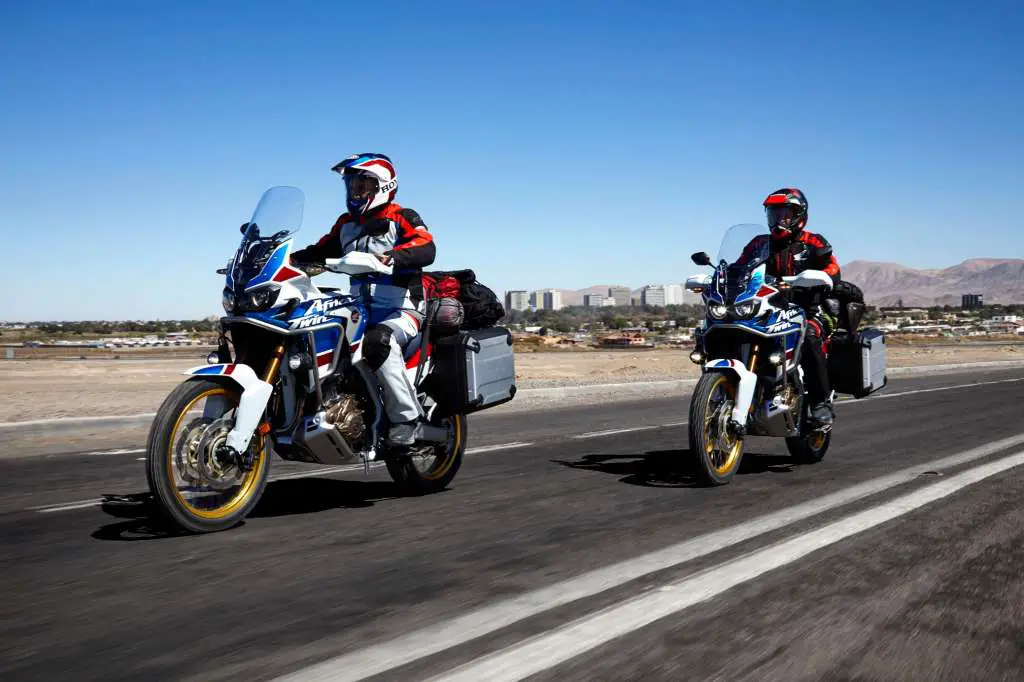
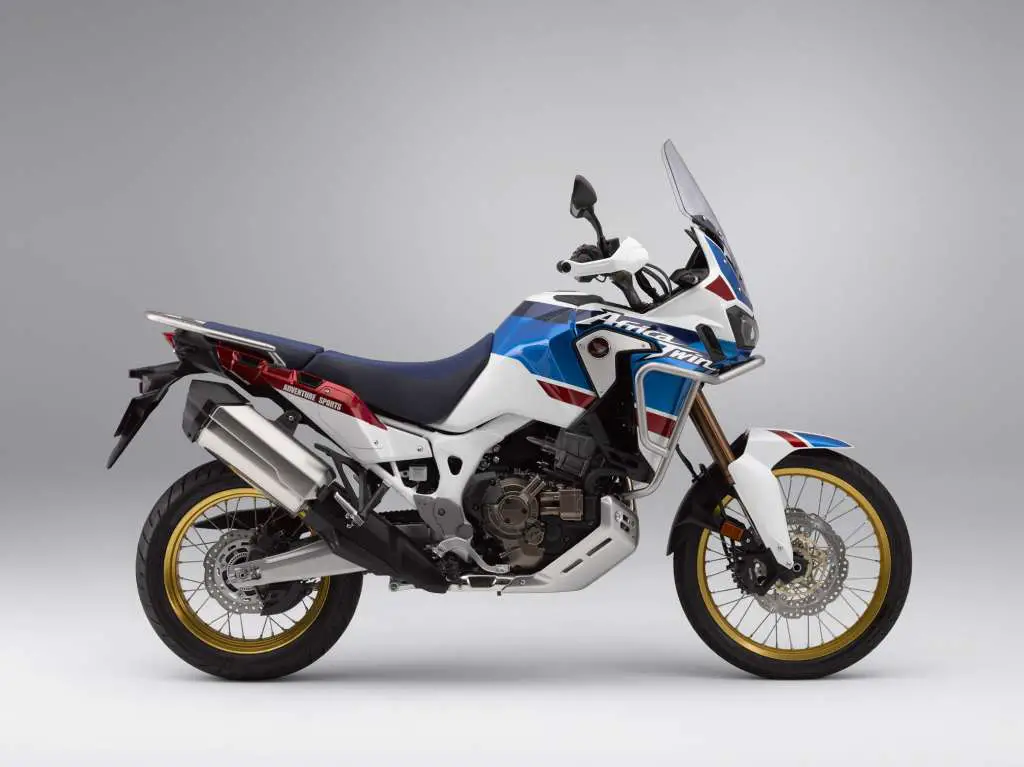
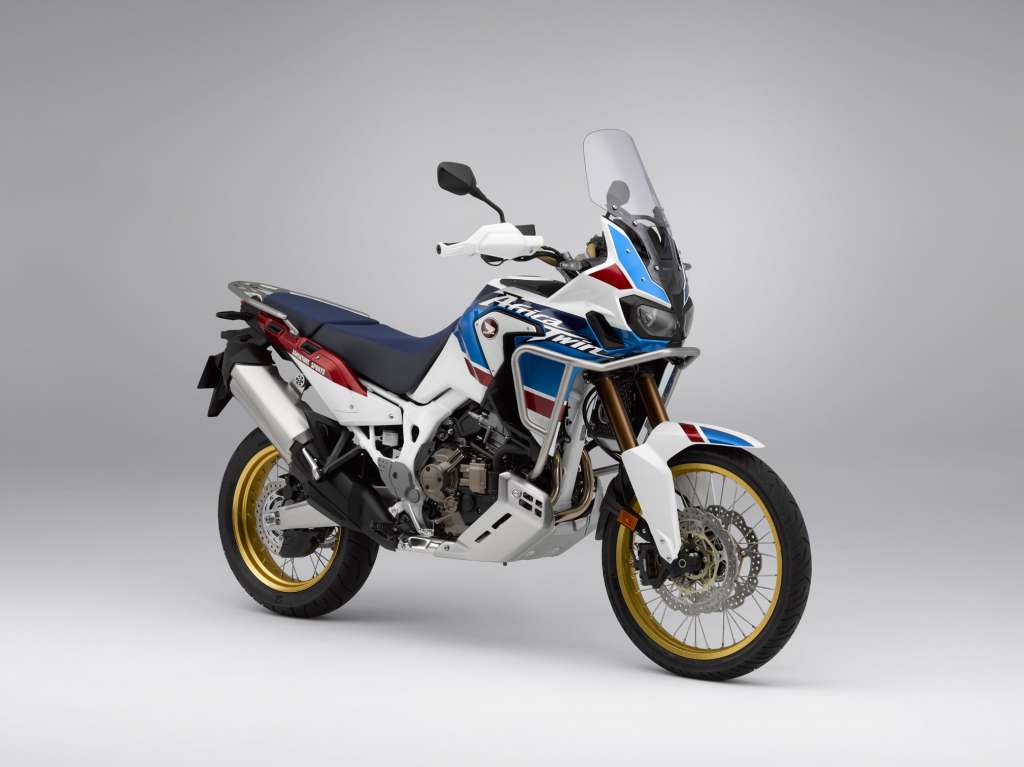
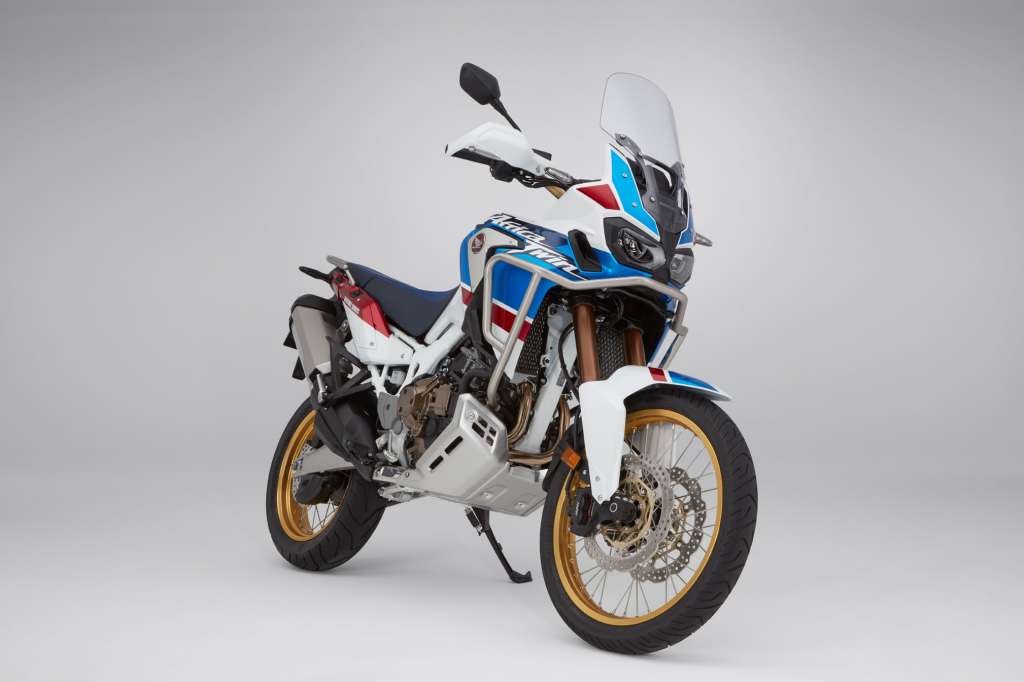
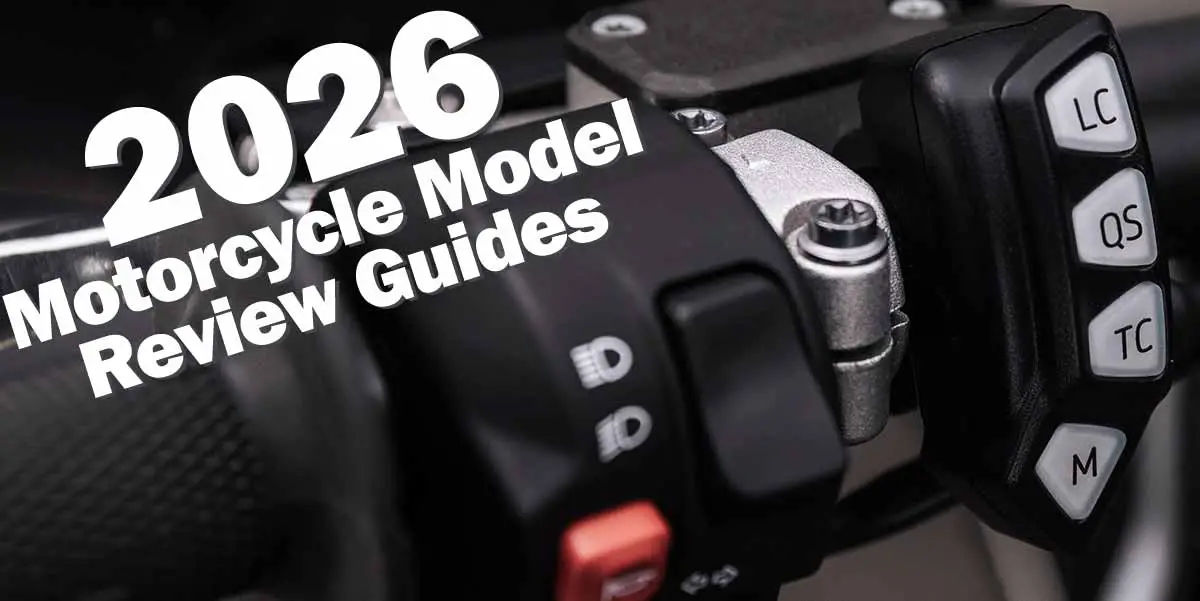
Be the first to comment